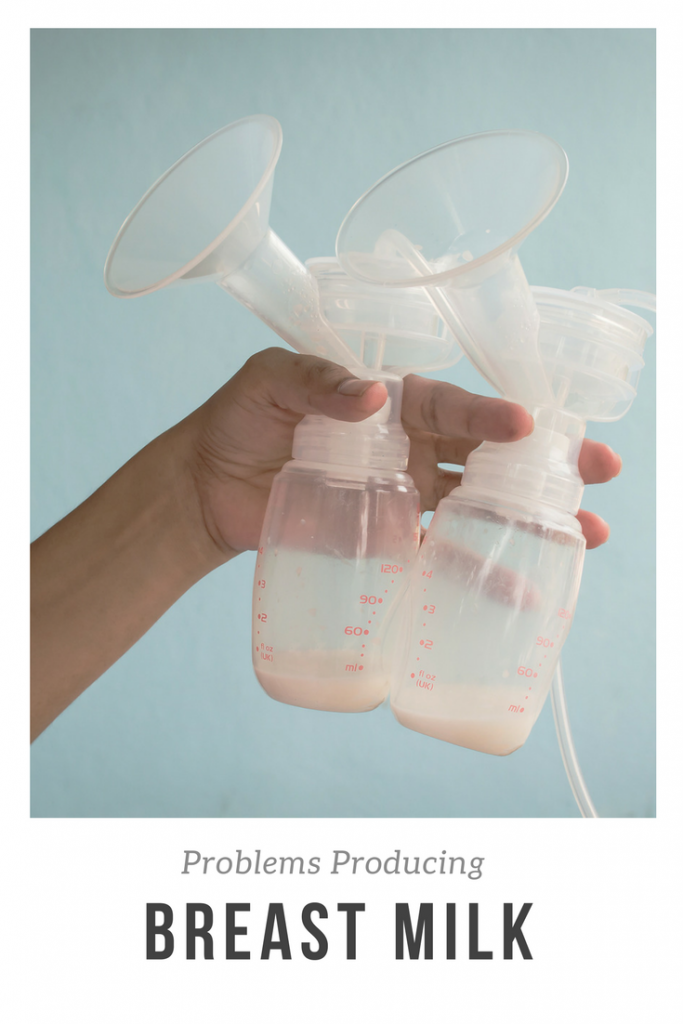Problems Producing Breast Milk
Despite breastfeeding being a biological process, there are circumstances under which women have problems producing breast milk, despite their best efforts and desires to do so.
Let’s talk about some of those reasons so you can best prepare yourself and seek help early on by reaching out to a lactation consultant. In the event that you previously attempted to breastfeed and couldn’t understand why it didn’t work for you, maybe this will help answer some of those questions for you as well.

Hormonal and Endocrine Imbalances
There are some known medical problems that inhibit your ability to make breast milk. These are usually hormonal or endocrine problems. When a woman’s hormones are imbalanced due to a medical condition, this can affect milk supply and cause problems producing breast milk. The two main hormones involved in breast milk production are prolactin and oxytocin, but progesterone, estrogen, and cortisol levels can affect the levels of prolactin and oxytocin in your body.
Polycystic ovarian syndrome (PCOS), thyroid dysfunction (either low or high thyroid function), diabetes, and high blood pressure are all examples of medical conditions that can cause low milk supply. Additionally, any hormonal imbalances that may have caused a mom to have trouble getting pregnant can impact breast milk production. This does not mean that you will definitely have a problem producing milk though. For example, 1/3 of women diagnosed with PCOS can struggle with an oversupply of milk.
If you have any concerns regarding these diagnoses, schedule an appointment with one of Western Missouri Medical Center’s (WMMC) International Board Certified Lactation Consultants (IBCLC). We will meet with you, weigh your baby before and after a feeding and discuss your production concerns.
Breast Surgery or Hypoplasia
In some instances, women do not have enough glandular breast tissue to support and hold a full milk supply for their baby. When this happens, one breast often looks different, or the woman may not notice breast growth during pregnancy.
If a woman has had breast augmentation or breast reduction surgery, there is a chance she will not produce enough milk for her baby. This is more commonly seen with breast reduction surgery, as it is more invasive and may remove the necessary glandular breast tissue.
The impact that breast surgery, a breast biopsy or a nipple piercing has on lactation varies greatly depending on the procedure, the scarring from the surgery and if any nerves or ducts were affected. Please reach out to your IBCLC if you have a concern.
Infant Sucking Difficulties
When an infant is not sucking effectively—either due to prematurity, illness, tongue tie or another problem—there is a high probability that this will negatively impact a mom’s milk supply. Milk supply is established in the first few weeks of the breastfeeding journey, and if a woman’s breasts are not being emptied or stimulated enough this will make her produce less milk.
Our body produces milk based on supply and demand. If we are not demanding milk (aka stimulating our breasts), our body will not continue to supply the milk. Frequent emptying of the breast encourages milk production and helps build a healthy milk supply for the baby. A good breast pump and hands-on pumping, as well as hand expression, can both help to preserve and protect a woman’s milk supply if this is the problem.
Medications and Herbal Supplements
Sometimes women are required to take medications while breastfeeding. It is always important to speak to your health professional and let him or her know you are breastfeeding if they are prescribing a medication. Some medications are known to cause problems producing breast milk. These include epinephrine, steroids, strong antihistamines, testosterone, estrogen, methergine, and pseudoephedrine. Some of these medications, such as antihistamines and birth control pills, are commonly prescribed. Parsley, sage, and peppermint are all herbs known to negatively impact your milk supply.
If you are concerned about a medication or supplement you’re taking, there are some wonderful resources available to you. Lactmed.gov is a reliable website that can give you information on the safety of a variety of medications. The Infant Risk Center through Dr. Hale is a hotline that is open Monday – Friday that you can call for medication safety during pregnancy and lactation. You can also always call us at the Stork’s Nest at WMMC at (660) 262-7519 to ask questions or get expert guidance on different medications and supplements.
The Need for Supplementation
There are circumstances when a baby will need to be supplemented early on for a variety of reasons. This is necessary at times, and not something that will automatically ruin your breastfeeding journey. The important thing to remember when supplementing is to not over-supplement or give more milk than the baby initially needs.
Breast milk comes in over time, knowing that a baby does not need much milk initially. When the infant is given more supplement than their belly can handle, it is stretched prematurely, and it is very difficult for a mom to keep up or produce that much right away. As a result, the parents and infant depend on formula to make up the difference, and it is hard to get your body to produce the needed volume if the infant is eating from a bottle versus at the breast, due to the nature of breast milk’s supply and demand principle.
If you are concerned about your breast milk supply or are having problems producing breast milk, schedule an outpatient appointment with one of our IBCLCs at the Stork’s Nest by calling (660) 262-7519. We’re here to support you.
